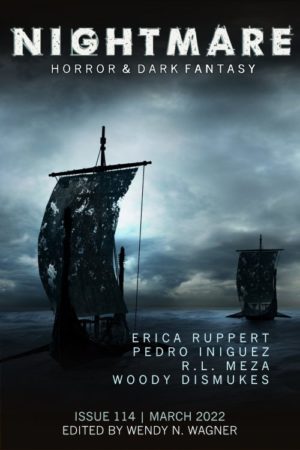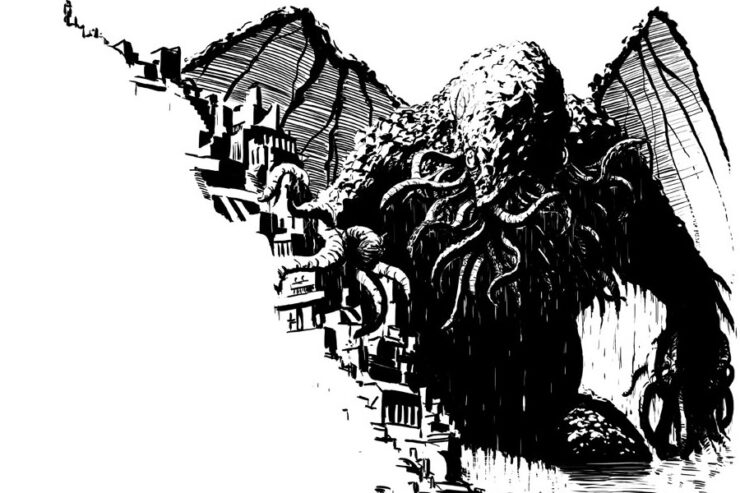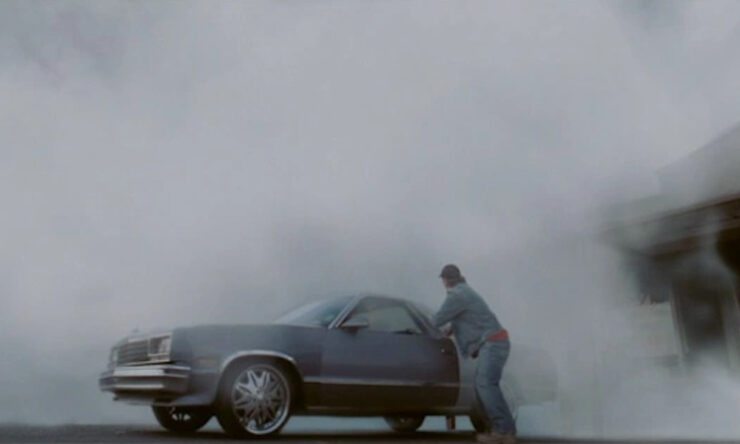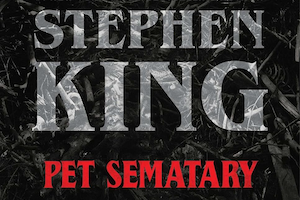Welcome back to Reading the Weird, in which we get girl cooties all over weird fiction, cosmic horror, and Lovecraftiana—from its historical roots through its most recent branches.
This week, we cover Erica Ruppert’s “The Golden Hour,” first published in the March 2022 issue of Nightmare Magazine. Spoilers ahead, but worth reading first! Content warning for death of children.
“His mother clutched the handful of dirt she was to have thrown onto Benjamin’s coffin, refusing to help bury her boy.”
Thomas wakes in the bedroom he shared with his twin brother Benjamin. Dusty golden light fills his eyes, shadows Benjamin’s toy-scattered bed. Benjamin isn’t there; instead there is another boy’s body, again. Thomas lifts the drained corpse, then lets it slump to the floor, seeing “the reflection of his brother’s face in the boy’s clouding eyes, his memory stronger than his sight.”
***
Their mother has called them to dinner; as usual, thirteen-year-old Thomas races Benjamin to the porch. But not as usual: when Thomas looks back, Benjamin is just emerging from the trees that overhang their stream. Also not as usual is the brightness in Benjamin’s eyes, the strange cheer in his voice. It doesn’t matter that Thomas won, Benjamin says. Tomorrow Benjamin will show off what he’s found in the stream.
The next day Benjamin still seems lit from within, “full of a marvelous secret.” In the stream Thomas sees something star-bright, “pale yellow light diffused beneath the rippling water.” When Thomas reaches for it, Benjamin restrains him. Be patient, he says. The light bubbles into the air and coils around Benjamin’s extended arm “like a trained serpent;” when Benjamin waves his arm, it clings to him, “trailing… like lace.” He doesn’t know what it is, but it likes him!
The light buzzes faintly, like “summer insects.” Share it! Thomas demands, reaching, getting pushed away. Let’s see if it will come to you, Benjamin says. As he steps into the stream, the light winds around his body and glides into his mouth, making his teeth gleam golden.
Unable to control his “raw resentment,” Thomas and leaps on Benjamin, knocking them both into the water, Thomas on top, Thomas squeezing Benjamin’s neck as he holds him under. When Benjamin lies still, the light streams from his eyes, nostrils and mouth, “more beautiful than Benjamin could ever be.” Thomas chases it through the stream, but the light eludes him. Returning to Benjamin, he sees remnant light in the blood flowing from his brother’s lacerated neck. He scoops up the stained water and drinks it. The blood tastes sour, but the light sparks in Thomas, making him feel hyper-alive.
Evening draws on, bringing Thomas awareness of what he’s done, and he weeps over his brother’s body until his mother’s call draws him away.
Neighbors recover the corpse. That night, listening to his mother’s sobs, Thomas watches a “faint tracery of light move under his skin,” its glow already fading. Sleepless, he wanders, “hating Benjamin for his light and missing him.”
Buy the Book
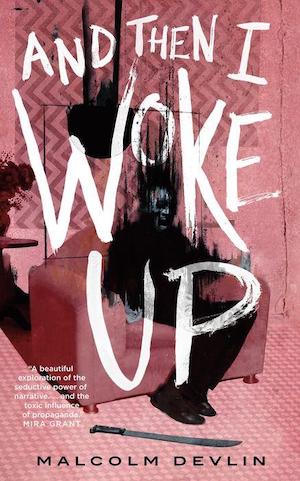

And Then I Woke Up
Only the preacher comes to see Benjamin laid out. The mortician’s carriage ferries him to the graveyard through “hot summer stillness” broken only by the fall of the horses’ hooves. Benjamin is buried beside their father; back at the house, the preacher must pry from their mother’s hand the earth she wouldn’t throw into the grave. He gives Thomas a sharp glance.
Before dawn, Thomas brings Benjamin home to the stream, where everyday he adds a stone to his cairn. His mother’s pleas can’t keep him from the water—one day the light will return. On the day it finally does, he dips fingers in the water, waiting for the “minnows” of light to approach, forgetting “how much he hated Benjamin for being its chosen vessel.” He slips, falls into the water, knocks himself unconscious on a stone. Water chokes him. He lies unmoving for hours, while small fish explore his eyes and mouth. Though cold and drowned, he revels, for the light is now in him.
It dims as the sun sets. His mother’s call rouses him to shambling, disjointed movement. He goes home to stay, no longer compelled by the stream, though incessantly hungry for what it fleetingly gave him. His mother clings to him, sometimes calling him Benjamin, reading to him from the Bible, but Thomas knows no prayer can release him. Seasons pass. His mother ages, but Thomas does not. He wonders how long his mother will try to believe he’s still alive. He can’t explain what happened to him, so it’s a relief when death ends her questions. He buries her in the garden and brings Benjamin from the stream to share the house with him
***
The family is forgotten. The house and land go neglected, but Thomas remains. He is still boy-sized, but his skin has dried to “brittle brown folds,” his limbs withered to sticks. His eyes are “damp, shrunken stones,” his teeth fangs. Like a lizard, he lies in the sun basking. Eventually someone must adventure to the abandoned house. Eventually the first boy does, looking like Benjamin, elusive golden light shining through his skin. With “inconsolable urgency,” Thomas attacks the boy, clawing, biting, gulping blood and so “slaking his thirst on the light.”
Dead, the boy doesn’t look like Benjamin. Thomas buries him in the yard. The light quickly dims, but other curious boys will come. He can wait, “without strength, filled with nothing but want of the light” that “never lasted, not in him. Never in him.”
***
He buries the latest boy who is not Benjamin in a shallow grave by the rest and lies down amongst them. He’s “no longer angry that [Benjamin] had kept him from the light, that day. Benjamin had surely known better.” He stays there in “the warm, honeyed summer sun” all afternoon. He remembers only summer now; summer “was when Benjamin was still alive.” But when evening comes, he rises knowing that “beside him, where his brother should have been, were only dusty bones.”
What’s Cyclopean: The light is like a serpent coiling up Benjamin’s arm, or lace, or fire on the edge of a sword blade.
The Degenerate Dutch: No degeneracy this week, other than in withering undead skin.
Weirdbuilding: Does the light make its host a vampire? A zombie? Something else?
Libronomicon: Thomas’s mother reads to him from Genesis, Leviticus, Psalms, and Acts. It doesn’t help either of them.
Madness Takes Its Toll: Sometimes Thomas’s mother thinks of him as Benjamin. Sometimes he lets her.
Anne’s Commentary
Basically there are four types of vampires: the ones that look and behave pretty much like normal people, like E. F. Benson’s Mrs. Amworth; the beautiful, alluring ones like Le Fanu’s Carmilla and Anne Rice’s Lestat; the blatantly inhuman ones, like the silent movie Nosferatu; and the corpse- or mummy-like ones, like Erica Ruppert’s Thomas. Many vampires can change their appearance, doffing pretty faces for monstrous ones once the victim’s been lured close enough—think Buffyverse vamps. Other vampires look fine when well-fed, more dead than undead when starved. Maybe Thomas would have been Edward Cullen-cute if he’d gotten more to eat, but his meals were infrequent. On second thought, no. Any beauty he achieved must have been momentary, for the vivifying light conveyed in blood “never lasted, not in him. Never in him.”
Benjamin’s another whole story. His name, derived from the Hebrew Binjamin or “son of the right hand,” suggests a favored child. Thomas, from the Aramaic Ta’oma, means “twin,” a word with a neutral connotation unless you park “evil” in front of it or associate it with the uncomfortable concept of the doppelgaenger.
Benjamin is the blessed son, “chosen vessel” of golden light. Thomas is the shadowed son, a twin not essentially evil but too capable of evil when gripped by his compelling vice, envy.
And so Thomas becomes the cursed son.
Hamlet’s King Claudius may say it best in his Act III monologue:
“Oh, my offense is rank. It smells to Heaven.
It hath the primal eldest curse upon’t,
A brother’s murder.”
It took only four humans in the world for one to draw God’s “primal eldest curse” down on himself! In Biblical mythology, Cain is the first murderer. He and his brother Abel offer God sacrifices, Cain the fruits of the soil he tills, Abel “the choice firstling” lambs of his flock. God is not a vegan, apparently. He smiles on Abel’s offering and ignores Cain’s. Understandably, I’ve always thought, Cain is pissed off. Envy is the sin crouching at the tent flap of his soul, and honestly, which of us can’t relate? And when the person greening our eyes is family, blood, emotion intensifies. Siblings gonna rival, okay, but killing your sibling is right out. It earns Cain the ultimate punishment: Not only must he be a “restless wanderer” on the earth, nobody’s allowed to kill him and end his misery.
So it is with Thomas, Ruppert’s fratricide. Far as we’re told, Benjamin does nothing to deserve the light’s favor—for him, it’s “just there.” His attraction for the light is innate, so how can it be fair that his own twin doesn’t share it? Why aren’t tomatoes as good as lamb chops? Why isn’t Thomas as worthy a light-bearer (a lucifer!) as Benjamin? These are questions infuriating beyond endurance for Cain and Thomas, and in one infuriated outburst, they doom themselves.
Thomas’s deed stinks not only to Heaven but to everyone around him. Those who see Benjamin’s lacerated neck must realize he didn’t simply drown. The preacher, too, gives Thomas the side-eye. What story does Thomas tell to shift suspicion from himself? None’s given in the text, and I infer that Thomas never does explain what happened to Benjamin. Lacking proof, or the stomach to seek it, the law doesn’t punish him. Instead, the community ostracizes him and his mother. The mark of Cain is on Thomas—death cannot relieve him of his guilt, of his longing for reunion with the brother he loved and hated, because he’s not allowed to die. The light that gave Benjamin greater life brings Thomas only undeath. An undeath, too, tantalized by fleeting tastes of potency, and in their wake insatiable hunger and slow withering.
“The Golden Hour” reminded me of a Keris McDonald story we read: “Special Needs Child.” In that one, the mother of the monster was the point-of-view character. Here the monster narrates, but his mother remains an intriguing character. I read some cutting aggression into her passivity, notably in how she sometimes calls undead Thomas Benjamin and in how she reads to him from particular books in the Bible: from Genesis, which contains the story of Cain and Abel; from Leviticus, with its emphasis on sin, uncleanness and an atonement Thomas feels is beyond him; and from Acts, in which Peter quotes the too-pertinent curse from Psalm 69, “May his camp become desolate, and let there be no one to dwell in it.”
Tolkien’s description (and Peter Jackson’s depiction) of Deagol’s murder by Smeagol also came to mind—another “fratricide” inspired by a lust for golden power. The One Ring has a mind of its own. Does Ruppert’s golden light have a mind, perhaps a god-like will to confer blessings or cause mayhem? Or is it a natural force, “just there” as Benjamin says?
I think Benjamin’s right. “The Golden Hour” doesn’t need to explain its central weird element. It can be “just there” to trigger events because the strength of the story is in its immediate emotional impact and lingering resonance. In the “Author Spotlight” interview accompanying “Golden Hour,” Ruppert says: “Personally, I find monsters far more interesting if they share the same desires and pains as we do.”
In Thomas, she’s created that monster.
Ruthanna’s Commentary
What’s bothering me—not as in “flaw in the story” but as in “still stuck in my head the next day—is that we see almost nothing of Thomas’s relationship with Benjamin prior to the light. Is he a natural infant terrible, who needed only a spark to push him from resentful sibling rivalry to fratricide? Or is the golden light a powerful force for corruption, able to turn an ordinary child into a killer?
The cosmic horror universe is full of both, I fear. Children can come out scary from the start, like Anthony or babies too smart for anyone’s good. Or, in some ways more frightening for a parent, deadly strangeness can lurk hidden or dormant or denied for years. Lovecraft and his taint-fearing ilk like to turn this up to 11, but at the same time kids really aren’t tabulae rasa.
The cosmic horror universe, however, is also full of things that change you irrevocably into their image with the merest word or touch or taste. It could be a book. Or a beer. Or a book-like force of nature. Or a painting. Or a book. Or, maybe, a wisp of light in a river. Lovecraft and his ilk, terrified that only comfortable illusion stands between them and chaos, like to turn this up to 11. But at the same time, doesn’t everything we encounter shape our minds?
What’s the balance between the reality that everyone has an irrepressible true self, and the reality that everyone’s selfhood can be changed (ideally for the better, sometimes for the worse) by nurture and circumstance? Or in a story, what’s the balance between the fantasy of innate evil, and the fantasy of irresistible corruption?
All that, from Ruppert’s choice to start the story at just about the point when the light first appears. We learn only scraps of Thomas’s and Benjamin’s life beforehand. Their father is dead, their community is sparse, and they’ve never been parted for thirteen years. It’s the sort of situation that could make brothers terribly close, but also terribly resentful. Has Benjamin always been the “golden child” whose light Thomas could never match? Or is that what the light tells him, warping his undead memories?
Thomas is no Carmilla, to hold onto the appearance of youth and innocence on the strength of his victims. As he says, the light in the blood is a lie, “a fleeting respite from the truth of the grave.” When it first calls to him, he feels more alive than he ever has before. By the end of the story, he’s near-dormant in an abandoned house, waking only to feed on passing kids for whom he’s presumably an all-too-accurate urban legend. It’s not much of an unlife. Whatever he once was, whatever potential he once had, the hunger and loneliness are all that’s left.
In some ways it’s a very traditional sort of vampirism, predating the modern charisma and creepy romantic obsession and fashion sense. But the origin doesn’t quite fit. The light appears out of nowhere the first time, and I’m not convinced that the perception of it in random others, pulling Thomas to feed, isn’t part of the lie. It seems more like the alien fungus in the shunned house than like Nosferatu.
Or like a certain color. That actually fits pretty well: maybe there’s no clever intelligence here getting a tour of the planet or even decent regular feedings. Just an abandoned child itself, stranded far from familiar physics, looking for scraps of similarity in the local fauna. You could almost… almost… feel sorry for it.
Next week, we continue Joseph Sheridan Le Fanu’s Carmilla, Chapters 7-8, in which Laura deals with night terrors.
Ruthanna Emrys’s A Half-Built Garden comes out in July 2022. She is also the author of the Innsmouth Legacy series, including Winter Tide and Deep Roots. Her short story collection, Imperfect Commentaries, is available from Lethe Press. You can find some of her fiction, weird and otherwise, on Tor.com, most recently “The Word of Flesh and Soul.” Ruthanna is online on Twitter and Patreon, and offline in a mysterious manor house with her large, chaotic, multi-species household outside Washington DC.
Anne M. Pillsworth’s short story “The Madonna of the Abattoir” appears on Tor.com. Her young adult Mythos novel, Summoned, is available from Tor Teen along with sequel Fathomless. She lives in Edgewood, a Victorian trolley car suburb of Providence, Rhode Island, uncomfortably near Joseph Curwen’s underground laboratory.










